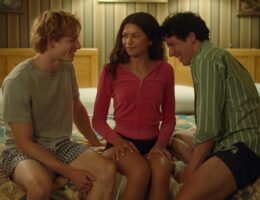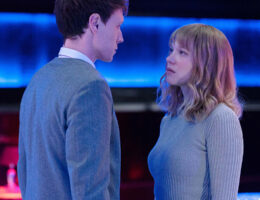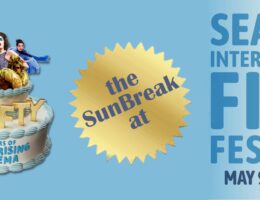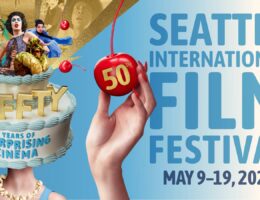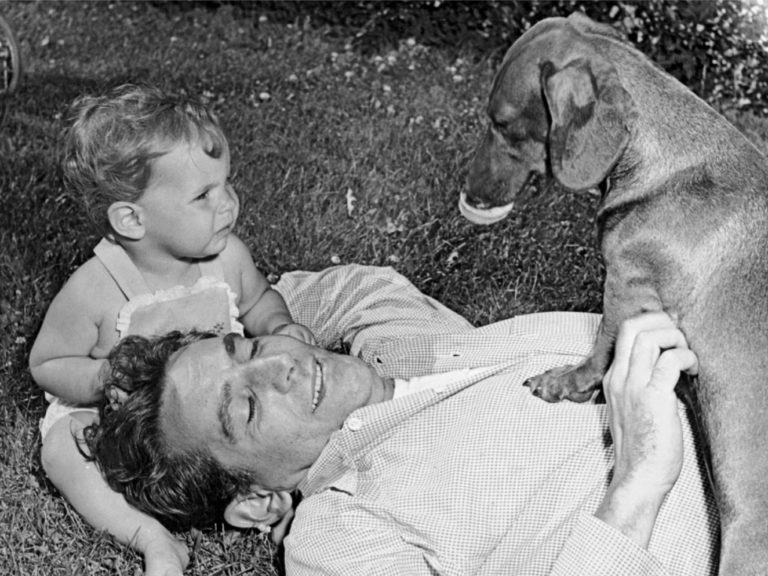The Seattle Jewish Film Festival kicks off tonight, and runs through April 7, showcasing a few dozen films and events featuring Jewish filmmakers and/or subjects. One of the events I’m most interested in is the centerpiece presentation of a documentary about the famous composer Leonard Bernstein (Leonard Bernstein: Larger than Life), and an appearance from Bernstein’s daughter Jamie. It’s on March 31 at 4pm at the SJCC on Mercer Island.
Jamie Bernstein wrote a gorgeous memoir of growing up in a world-famous household. Her book, Famous Father Girl: A Memoir of Growing Up Bernstein, gives us a glimpse of what life was like growing up with one of the world’s most famous people as a parent. It’s probably the best “child of a celebrity” memoir I’ve ever read because Bernstein is a gifted writer with a unique perspective and story to tell. It came out in 2018, with the centennial celebration of Leonard Bernstein’s life and music.
Ahead of her appearance at the SJFF, I spoke with Jamie Bernstein by phone.
The first thing I want to ask about is your beautiful and moving memoir Famous Father Girl: A Memoir of Growing Up Bernstein. I feel like your father was one of the last real public intellectuals and someone who was known way beyond classical music, and your book gives us a portrait of who he really was, not so much based on what he accomplished (although his accomplishments are impressive, obviously). How did this book come about?
I’m glad you liked that, and that’s means I did my job.
I had been thinking for a while about writing a memoir, and I had some ideas about it. And then I went to talk an acquaintance who was a book agent and he invited me to his office to talk about it. And I told him some of my ideas, and after a while, he said, “Well, you do realize that if you write a memoir and you key it into your dad, and it comes out during the centennial year, you’re gonna sell a lot of books.”
It was a completely pragmatic observation, but it was like he shot me out of a cannon. And I realized, “Oh, my God, it’s true. This is it. This is absolutely the perfect moment.” And it was also the perfect moment for me personally in my own life. So it was just good timing, and I just launched that very day.
Were you surprised at the reaction you got? I mean, I read about it in The New Yorkerand heard you talk about it on NPR, for example.
I couldn’t have hoped for a better response, and I’ve gotten amazing letters and emails from all kinds of people whose opinion matters to me, telling me that they really enjoyed it. So it’s been unbelievably gratifying.
…and there’s still interest in your story and your father’s story, even after the Centennial celebration. For example, the Seattle Jewish Film Festival is bringing you here and showing your documentary…
They’re showing my documentary at the festival?
Yeah, I believe so. That’s my understanding, at least. (Confirmed)
Oh, that’s wonderful.
Wow! I broke some news then.
Yeah, you did. I had no idea. That’s really fantastic, so it’s like a two-fer.
Were you worried about putting your book into the world when everyone’s opinions on your father seem to be cemented, and it being so personal?
Well, I was worried about everything. I’m a worrier, so I’m worried about everything. But my general rule of thumb, in taking on the book and telling all the stories about my family was that, it’s only when you try to suppress something, or obfuscate something, that’s the thing that’s gonna come around and bite you in the butt. So my approach was to tell the story as I experienced it myself, just banking on the fact that telling it that way would be the best way to tell it.
Were there things you discovered writing the book that you didn’t know about your family, or were different than what people thought they knew about your father?
Lots of things. One particular thing that people didn’t know about was that my parents … We discovered that our parents went into their marriage with their eyes wide open about the fact that my father was bisexual. My mother knew it, and she wrote a letter to my father saying so. And we only found that letter about less than 15 years ago. And I’m so glad that we found it before I wrote the book, because it was an incredibly powerful piece of information to have. We didn’t know that for a fact until we found that letter that had been sealed in an envelope, and we found it. It was in the back of a file cabinet at the Bernstein office, and it was a tremendous find.
That was one of the most surprising things I remember from reading your book. It was so interesting to me because it could’ve been so scandalous if it was known then.
It was a while ago, and it’s not like now where people have a vocabulary and a way of talking about their sexuality, and it’s so much more relaxed now than it used to be. But back then it was still very hard to be out and to talk about it, and to talk about it within a family. It was early times for all of that. And so, it was a big challenge for all of us.
Another big moment I wanted to ask about, and I’m curious because I’ve never been a fan of the guy, was the dinner at your home that Tom Wolfe wrote about for New York magazine. I thought it was a really malicious piece. And, frankly, racist.
Well, I feel like I will just spend the rest of my life correcting that, speaking out to the world on what actually happened. I’ll never finish clearing it up. It’s a confusing episode for sure, and it requires some explanation. So I’m just resigned to the idea that I’ll just have to keep explaining it for the rest of my life.
And you also write about how your mom hand-delivered a letter to the New York Times that they held on to for several days before publishing.
I think they treated her shabbily, and the whole incident was so weird, the way The New York Times went out of their way to excoriate the event. I mean, to go all the way to writing an op-editorial, and editorial. It was weird. I feel like there’s more to the story, and I don’t know what it is, but there was something going on there that they just had it in for our parents for some reason. I don’t know.
It did feel like a cheap shot. I think the Black Panthers were so polarizing. White people were scared of them, and the FBI was pretty busy stirring it up so that white people would be even more scared. And they were also very interested in driving a wedge between black people and Jewish people. And the Panthers were perceived as anti-Zionist. And so, the FBI really stirred that pot. And so, it’s possible, I’m just theorizing here, but it’s possible that members of The New York Times editorial board, many of whom were Jewish, really had it in for the Black Panthers, and thought it was unseemly for Jewish people to support them maybe.
I want to move on from this for now and ask about Jamie Bernstein, not Jamie Bernstein, daughter of Leonard. This is a really well-written book. Will you write another one on a different subject?
I am absolutely writing something else now. I’m on my next project. It’s too soon to talk about it because it’s still very early, but I’m working away at it. So we’ll see how it goes.
I’m glad to hear that. I think Famous Father Girl is a book worth reading because you’re a very good writer, not (just) because you’re Leonard Bernstein’s daughter.
Well, I will take your thanks and I’ll also pass them along to my editor, who really helped me shape it, and hone it, and boy, did he work me hard, the editor at Harper Collins. I got lucky because in today’s publishing world, you don’t get the kind of editorial attention that author’s used to get back in the day. And I got really lucky that this editor, Jonathan Jao, was so attentive and rigorous. And he really, really pushed me, and sent me back again, and again, to make it better, and make it better, and make it better. And so, I really give him a lot of credit for helping me shape it.
Let me ask now about the centennial because it looked like there were so many events, but there were a lot of people invested in celebrating your father’s life and wanted to do it the right way.
We have an office with people who work in it and know our dad and know his legacy and his issues. And so, boy, did we work for the centennial. And it was so gratifying, because we all were hoping for something big, but even we were surprised that on the database that we keep tracking all the centennial related events worldwide, it went soaring past five hundred. And so, that was kind of overwhelming. No matter how hard my brother and sister and I tried, we were never gonna catch them all.
It must say something about your father that there were five hundred-plus events across the world celebrating 100 years.
It turns out he was the perfect guy for a centennial, because he was so multifaceted. There’s something for everyone to celebrate. So not just orchestras playing his music, but also ballet companies putting on his ballets, film festivals putting on the films that have his music in them, and libraries putting on symposiums, and all these educational institutions, because his educational legacy was so gigantic. And on and on it goes. So there was something for everyone, it turned out.
Right! And it doesn’t seem like there are any classical musicians that have are as recognizable now as your father was when he was alive. I mean, there was a story that won a Pulitzer Prize a few years ago where one of today’s most famous classical musicians was basically unnoticed when he was busking for change in a Washington DC subway station.
Yeah, well, that happened. Oh, I wish I’d been on that subway platform. I would’ve been thrilled. Joshua Bell in the subway would’ve been pretty good. But your point is that people just walked right past him having no idea who he was.
Yes! And that everyone knew who your father was 30 years ago, even to people that don’t listen to classical music.
Is there something you want people to know about you, beyond being the daughter of someone really famous?
I’m really, really gratified that people know me as a writer, because I spent a large part of my life being too afraid to be a writer, too afraid to put myself out there and not sure that I could pull it off. And so, now, I feel great when people ask me what I do. I say, “Well, I’m a writer.” And I am, I’m a published writer! And I just dreamed of this privately for so long. I almost didn’t let myself dream about it, because I hoped for it so much. So every time I do one of these book events, and my book is all piled up for people to get me to sign, I pinch myself.
I still can’t get over it, that I actually wrote a book and it was published and it’s out in the world and people like it. That’s just the greatest thing that ever happened to me, honestly. So that’s part of why I’m writing another book. I have a feeling that the next book, whatever it is and however it works out, probably won’t get the same kind of attention that this one did, because it doesn’t have that built in engine like this one did, because of my dad and his centennial. I know that everything was working to help put it out it in the world. But I’m still hoping that whatever I come up with next will be well received.
Can I ask if there’s anything you want to talk about before I turn off my tape recorder and let you go about your afternoon?
The only thing we didn’t talk about when I was listing all the different things about my dad and his broad banded-ness, that we can celebrate during the centennial. I didn’t get to the last thing, which I love talking about, which is his lifelong work as an activist and a humanitarian. And that is also such rich meaningful legacy, and is so much about who he was. Starting in his 20s, he was already giving his name to organizations that were doing something good in the world, giving money, and putting on benefit concerts. He was always trying to make the world a better place, and he did it through his music too so often. And it was a wonderful way for us to grow up, feeling that when you saw something wrong in the world, and you perceived an injustice, you stood up and you spoke up. That’s what you did.
But the thing is that because my father started being that way, all the way back in the 1940’s, he was being observed by the FBI the whole time. He was always giving them something to track him about. And starting all the way back in the 1940’s with all those left wing organizations. And then in the 1950’s, suddenly it was really dangerous to be affiliated with left wing organizations during the communist scare. Then it was civil rights, and then it was the Vietnam War, and then it was no nukes, and advocating for AIDS research, and patient care.
And I mean, he was always giving the FBI something to follow him about, to say nothing of the Black Panther fundraiser, which was such a ruckus. So in the 1980’s, through the Freedom of Information Act, my father could finally view his FBI file. And it’s a kind of badge of honor, I think, because it shows how nothing would slow him down when it came to speaking out. And he knew the FBI was keeping tabs on him. He knew, and he knew his phone was probably tapped. And it just didn’t stop him from speaking out when he felt that there was a wrong that needed to be righted. So I think that’s another wonderful thing about my dad that I like to communicate about.
{Jamie Bernstein can be seen at the Seattle Jewish Film Festival on Sunday, March 31, at 4pm at the Strom Jewish Community Center on Mercer Island. More info and tickets can be found here.}
{This interview appeared on my personal blog in 2019 and is reposted here.}
